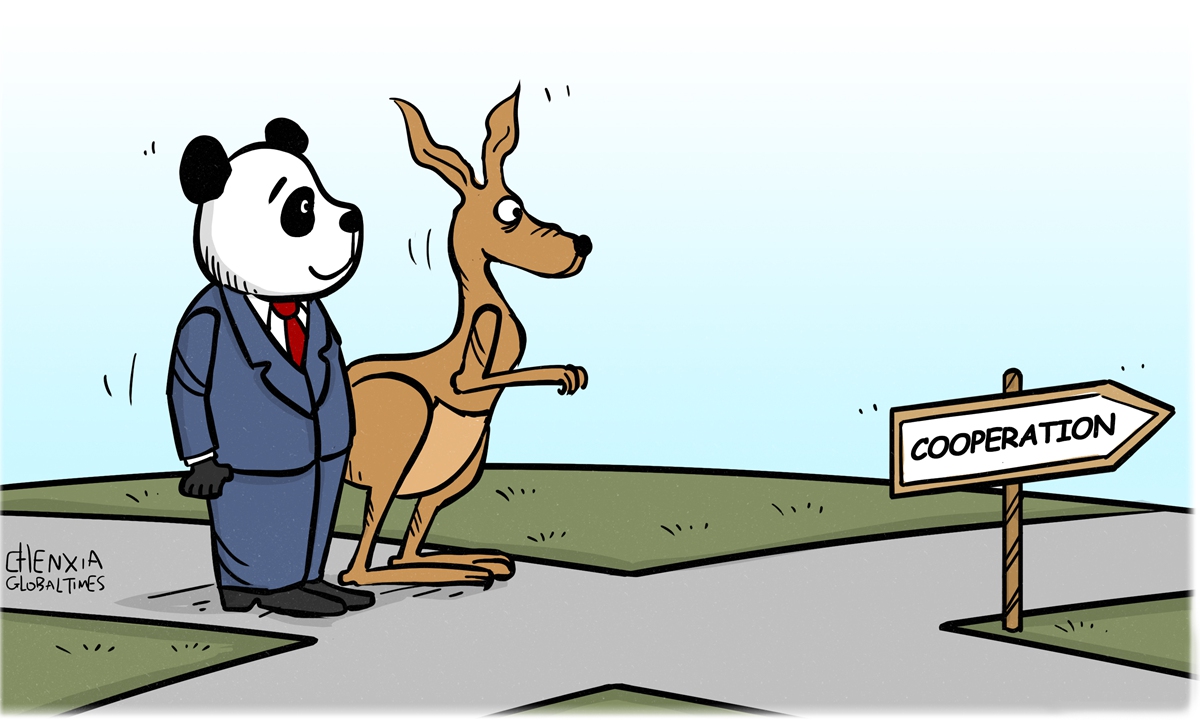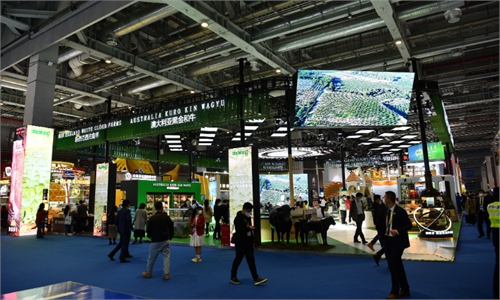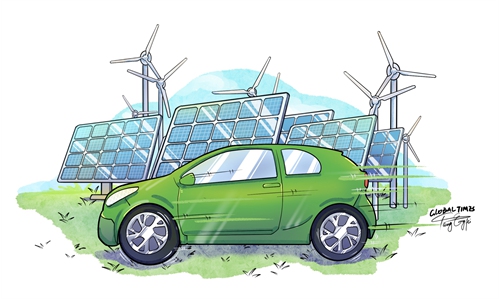
Illustration: Chen Xia/GT
During a press conference on Saturday, Australian Prime Minister Anthony Albanese specifically highlighted the improvement of Australia's relationship with China as one of the principal tasks on his government's agenda in 2023.Albanese's remarks apparently set the key tone of Australia's new China policy for the new year. Since the Labor government took office after defeating the Liberal-National Coalition in the federal parliament election in May 2022, Canberra has worked to change the relationship with China, setting itself distinctively apart from the belligerently anti-China administration under Scott Morrison.
With the very positive and constructive meeting between President Xi Jinping and Albanese during the G20 summit in Bali in November 2022, both sides have been working assiduously to seek solutions to differences and disputes between the two countries, in particular with relation to trade, and to bring about a reset of the bilateral relations.
Media outlets recently have been fraught with optimistic reports that China is ready to resume imports of Australian coal, and Australian rock lobsters are also expected to return to dinner tables in China within the year. As China's Vice Premier Liu He said at the Davos Forum on Tuesday, in spite of the low growth in 2022, the country's economy is on the right track to revitalization and recovery with the implementation of a series of post-COVID measures.
As a matter of fact, Australian energy and mineral producers and exporters have already seen enormous demands in the dynamism that is being released in the world's second largest economy. Meanwhile, Australian agricultural, husbandry and dairy products have always been topping the shopping lists of Chinese consumers with their ever increasing appetite for high-quality goods.
Meanwhile, China's international travel policies have recently been optimized and adjusted, opening the door to both inbound and outbound travelers for business, education and holiday making. China has been Australia's largest source country of international tourists and students. The previous Australian government's aggressively antagonistic China policy used to create an extremely unfriendly atmosphere, intimidating and deterrent to Chinese visitors. A positive relationship is therefore vitally favorable to people-to-people exchanges between the two countries.
In addition to trade cooperation in traditional fields, China is happy and ready to work jointly with Australia in new domains. Both countries, for example, are striving to achieve their "carbon zero" targets with vigorous measures to limit the exploitation of fossil fuels.
China has state-of-the-art photovoltaic and wind power technology, and the immense capacity to manufacture solar panels and windmills.
There is obviously mammoth potential for the two countries to collaborate with Australia's optimal natural conditions favorable to the development and application of clean energy.
Other new realms of cooperation include climate change combat, the blue economy, the ever-expanding services industry, and so on. The Chinese enterprise Tianqi Lithium's recent proposal to cooperate with Australia's lithium developer Essential Metals is a promising initiative with mutual benefits for electric vehicle development.
As both governments have affirmatively maintained, China and Australia are comprehensive strategic partners. A sanguine and vigorous relationship not only contributes to the economic and social development of the two countries, but is also conducive to the stability and prosperity of the Asia-Pacific region, and of the world.
China welcomes and supports Australia to play a strategically more important role on the international arena, on which multilateralism serves as the guiding principle. China is willing to work with Australia to promote economic development and improvement of the people's livelihood in the Pacific region.
Therefore, China resolutely opposes the US' recent attempts to enlist countries, including Australia, to form exclusive groupings and cliques with the purported aim to impair and deter China's peaceful development.
China takes no interest in influencing and interfering with any other country's internal affairs, never seeking to alter their political, economic and social affairs. China, in turn, expects reciprocal respect of its national independence, and recognition of differences in the governance systems, values and cultures.
Issues of core national interest, in particular with regard to sovereignty and territorial integrity, are red lines not to be transgressed and violated. The Morrison administration's "drums of war" rhetoric was obnoxious to the normalcy of international relationship, and should never recur.
According to the Chinese zodiac, the forthcoming Chinese New Year is the Year of the Rabbit, an animal of sharpness and alacrity. With proactive efforts from both sides, we have the positive reason to look forward to a speedy reset of the bilateral relations.
The author is president of the Chinese Association of Australian Studies and director of the Australian Studies Centre at East China Normal University. opinion@globaltimes.com.cn



